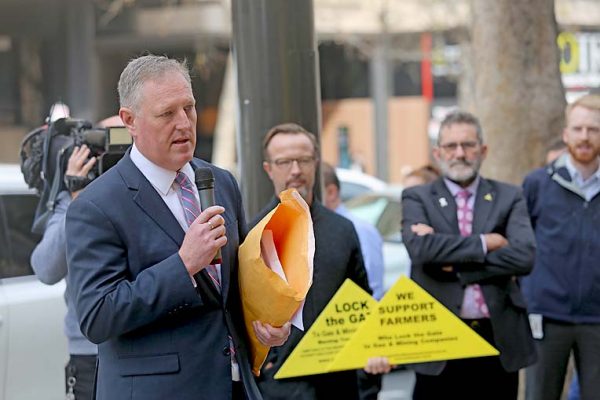
INDEPENDENT MP Troy Bell has reaffirmed fracking will not occur in the Limestone Coast as long as he is elected after the Federal Government supported the development of unconventional gas exploration across the country.
Australia’s lead scientific agency CSIRO conducted a three-year study into the air, water and soil impacts of coal seam gas fracking in Queensland’s Surat Basin and found little to no impacts on air quality, soils, groundwater and waterways.
The impact of fracking on human health was not included in the scope of the report.
Undertaken by the CSIRO’s gas unit, which is a collaboration between the Commonwealth Government, state governments, industry and the CSIRO, Origin Energy contributed $245,670 (74pc) to phase one of the study and $1.28m (61pc) to the second phase.
Although the study said the representativeness of the findings to other sites was dependant on other factors including underlying geology and well depths, Federal Resources Minister Keith Pitt welcomed the findings and hoped it would attract more resources companies to consider investing in other unconventional gas developments.
Mr Bell stressed any decision to allow unconventional gas exploration or extraction was dependent on state governments.
“The Federal Government can say whatever they like, but we have made a state decision based on the feedback we received from the South East,” he said.
“While I am the Member for Mount Gambier, there will be no fracking in the South East.
“I think we have the balance right in the South East and we have conventional gas activities, but the 10 year moratorium on fracking in my mind strikes the right balance for my community.”
Mr Bell also raised concerns about the industry-funded report, saying truly independent reports were vital.
“A study funded by the gas and oil companies is far from independent and quite often, the terms of reference can dictate the outcome you are after,” he said.
But Mr Pitt said the report was the most comprehensive investigation into hydraulic fracture stimulation undertaken in Australia and should “pave the way for further investment in gas exploration and development across Australia”.
He said the study had confirmed fracking for coal seam gas – which is typically extracted from coal seams and differs from shale gas targets in the Limestone Coast – was a safe practice.
The senior minister said the report confirmed steps taken by the industry to protect the environment and hoped it would “attract more resources companies to consider investing in CSG and other unconventional gas developments”.
However, Member for Barker Tony Pasin said the study had limited application to the Limestone Coast given the region’s unique hydrogeology.
“The geological character of every region varies greatly and therefore I do not believe this study will have any impact on the potential for unconventional gas extraction in the Limestone Coast, particularly as the newly identified resource is able to be mined conventionally,” he said.
Limestone Coast Protection Alliance chair Angus Ralton dismissed Mr Pasin’s comments, warning the report could be used by companies as leverage to remove the State Government’s legislated 10-year moratorium on fracking in the Limestone Coast, which is due to expire in 2028.
Mr Ralton vehemently rejected the results of the study and said the industry-funded report was akin to “health research from a cigarette company”.
He agreed with the national arm of Lock the Gate, which slammed the study for describing sampling six months at six wells as comprehensive.
“The CSIRO is not even a shadow of the world-renowned scientific research body it once was, it is now a vehicle for cash for comment,” he said.
“Consecutive governments should be ashamed the CSIRO has been completely obliterate in scientific reputation and they should be disgraced one of the leading bodies of research in the world has sunk this low.”
The Australian Petroleum Production and Exploration Association (APPEA) said the report provided further evidence the impacts of fracking can be managed by robust regulation and high industry operating standards.
APPEA chief executive Andrew McConville said the field study backed up more than a dozen independent scientific inquiries which have confirmed properly regulated fracking was safe.
“While there some in the community who continue to make false and exaggerated claims about the environmental impacts of gas exploration and production, all the credible evidence confirms properly-conducted gas activities have negligible impacts,” he said.







